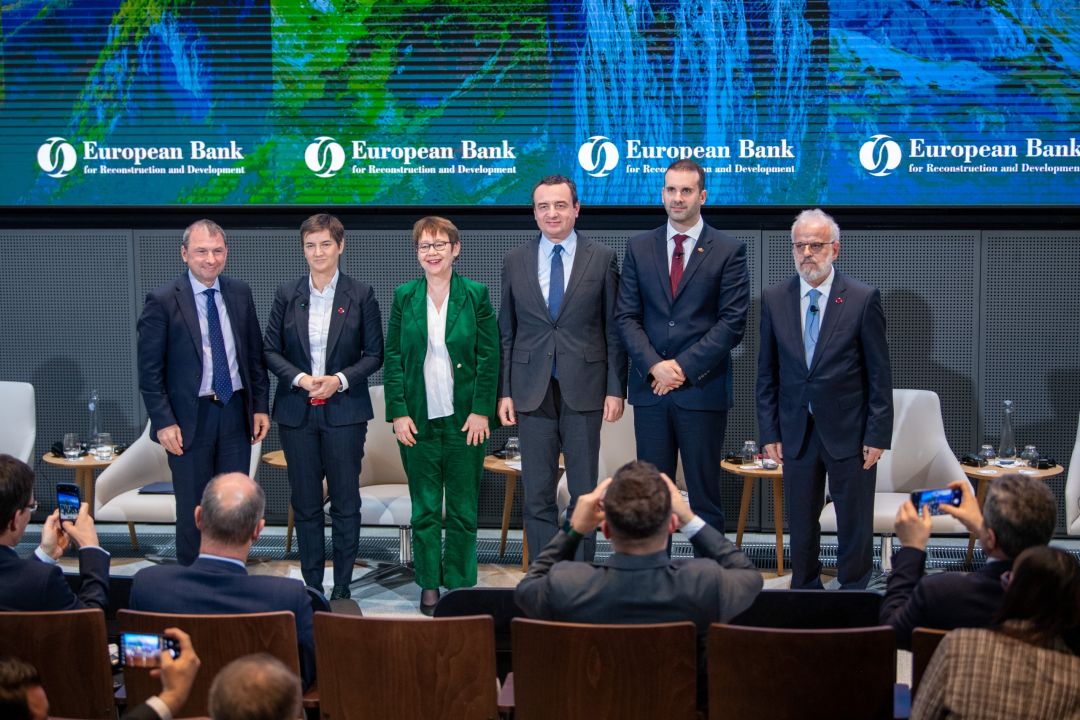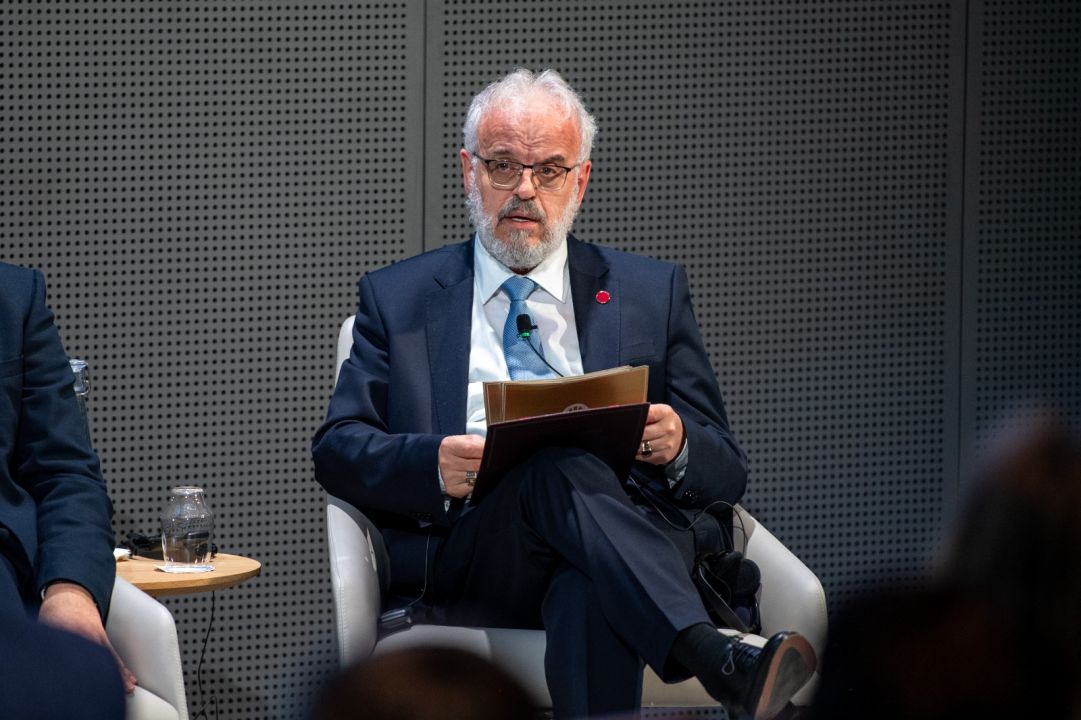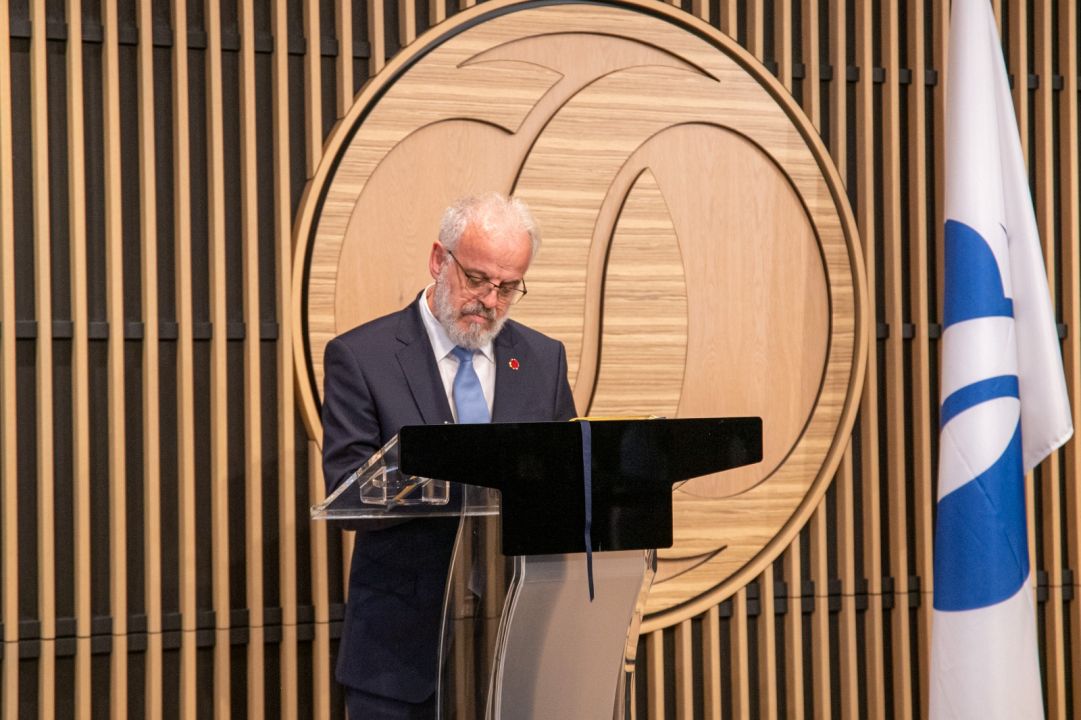The President of the Government of the Republic of North Macedonia, Talat Xhaferi, is participating at the WB Investment Summit of the European Bank for Reconstruction and Development, accompanied by the Deputy President in charge of economic affairs, Fatmir Bytyqi and the Minister of Finance, Fatmir Besimi.
At the Summit, PM Xhaferi took participation in the discussion on the panel of Prime Ministers which included prime ministers from the Western Balkans – the Prime Minister of Montenegro, Milojko Spajic, the Prime Minister of the Republic of Serbia, Ana Brnabic, the President of the Council of Ministers of Bosnia and Herzegovina, Borjana Krishto, the Prime Minister of the Republic of Kosovo, Albin Kurti, and the Prime Minister of Albania, Edi Rama, together with the host of the Summit, the president of EBRD, Odile Renaud-Basso.
During the first part of the discussion, the prime ministers the prime ministers discussed on the topic: “Why foreign investors would invest in countries from the region,” and PM Xhaferi underlined the following:
“We are witnessing numerous changes, crisis, conflicts that have direct impact over all global economies. This gives us the first answer to the question why foreign investors would invest in North Macedonia, and that is due to the disruption of the global supply chains. Due to the proximity to the European centres, North Macedonia is one of the destinations for setting up production. We have convenient location, good connections, and ports in our vicinity, such as Thessaloniki and Durres, so in noticeably short time the product manufactured in our country can reach another country, that is, its final destination.
The second argument is the stable situation in the macro-economic and fiscal terms, the intensive process of harmonization of the national legislation with the Acquis, the favourable business environment, and well-developed programmes for support of investors. North Macedonia does not have laws which discriminate the foreign investors; we consider them as our own investors because they all contribute to the same objective – improvement of quality of life for the citizens.
A third argument are the significant stimulations for the companies which work in our country. These include various measures, as follows: subsidies for new jobs and capital investments, subsidies up to 50% of the acceptable investment costs for research and development, and support of exporters. The low level of taxation on profit on corporate level and taxation on personal income, which is 10% rate of corporate tax and personal income tax, stimulate growth of the economic activity and investments. We have several technological-industrial development zones which operate successfully and are particularly attractive to the foreign investors.
Our country is a leader in the region in terms of implemented laws and bylaws which are fully harmonized with the European Energy Community, thus enabling liberalization of the energy market. We started negotiations with the European Union, and we are a NATO member-state. This offers stability. We have agreements for free trade with the EU (27 member-states), EFTA (4 countries), CEFTA (7 countries), free bilateral trade with Türkiye, Ukraine, and the United Kingdom”.
At the second part of the panel the prime ministers discussed the priorities of the Governments in the region, as well as the cross-border cooperation. Prime Minister Xhaferi stressed:
“The Republic of North Macedonia, when adopting the Law on Energy, practically liberalized the market in the energy segment. The attractiveness for investments in renewable resources is precisely in that regard, considering that the country has over 250 sunny days during the year. And there are opportunities to harness the power of the wind so that it can be used as resource as well. Of particular importance is the electrical-energy connection with the neighbours. The project for connection with the Republic of Albania is in progress, and with that the process of electrical-energy connection with all the neighbours will be completed.
Road and railway infrastructure is of immense importance taking into consideration that there is an ongoing construction of the railway section Kumanovo – border with Bulgaria, and with this, we are connecting further to the Bulgarian infrastructure. Corridor 8 and part of Corridor Xd enable connectivity on the relation Ionian-Adriatic-Black Sea route, and from geostrategic aspect, is the importance of this corridor, especially in the context of NATO, the need for movement and communication in logistical sense, taking into consideration the situation in the region of Black Sea, and of course, the Middle East.
In terms of energy, we are working on the inter-connector, gas-connection with Greece and Serbia in context of the internal need of gasification of the Republic of North Macedonia, and in that line are the projections for such connection.
This are mainly the projects. Part of the projects were mentioned by PM Kurti, such as the connection with the Republic of Kosovo. On our behalf, there is an obligation for our half, and we have a signed bilateral agreement; also, we have provided the funds for connecting Corridor 8 with the highway Arben Xhaferi. There is an ongoing procedure for selection of a contractor, and the completion of this section is to start soon. The whole region is being connected in terms of highways, and this contributes to the speed of communication even in economic terms, i.e., the investments in our country. This is not the time or place to enumerate the smaller projects, but there are quite interesting projections which the foreign investors, who are welcome, might find particularly attractive.”













